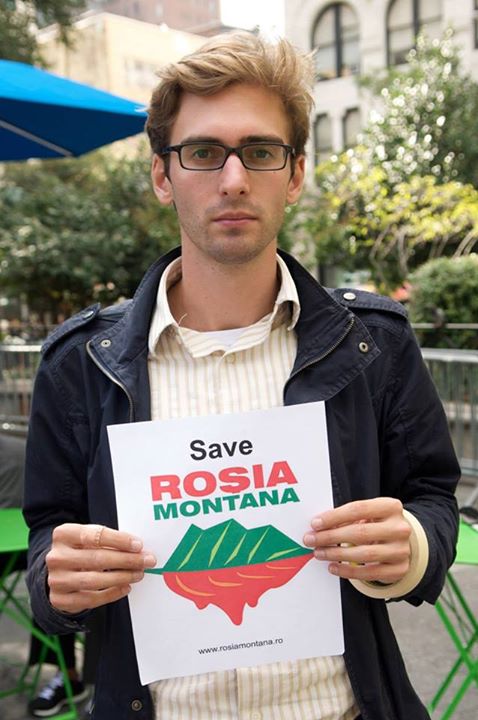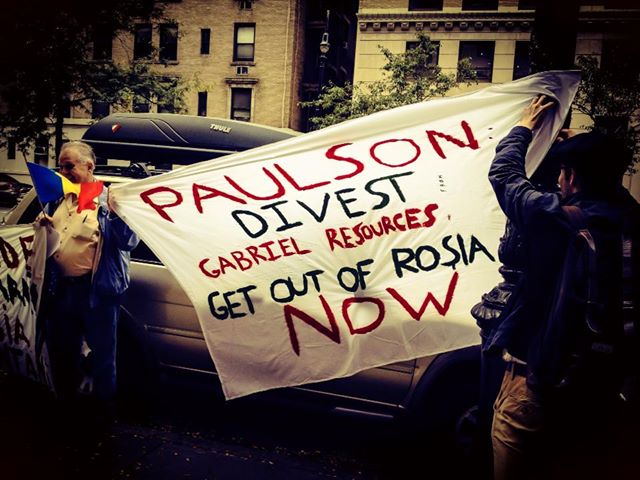





I
first met Jack Feinberg on Sunday September 22th
2013 in
Union Square, where a group
of protestors had gathered to demonstrate against the Roșia
Montana gold mine project. He was holding a sign
and shouting United We
Save Rosia Montana!. I was intrigued by
his exotic presence in the Romanian group and impressed with his
determination - so I instantly wanted to learn more about him.
This interview took place on September 29th, at the end
of a protest where Jack and other activists organized in front of
the residence of Mr John Paulson, whose
hedge fund is the single largest shareholder of
How did you get involved with the protest against Roșia Montana gold mine exploitation? You're not Romanian -- why are you doing this? We can't chose the country we are born in, and the simple truth is that in all my travels throughout Europe I identified with Romania and Romanians more so than any other place or people. In a way I can't quite explain, eu sunt român. Maybe because my great grandfather was born in Basarabia. What made you visit Romania? Well, I started traveling through Europe when I was 24. I started in England, went to France, Italy...Then I arrived to Romania and I felt a strong connection with the people. Things fell into place and I stayed there for one year and a half. You have been present to the most, if not every street action here in New York against the Roșia Montana gold mine exploitation project. Explain what are you manifesting for and what are your demands. This is my first political
action of any kind. I see myself as an American involved in
international actions against unsafe mining techniques. With
Roșia, there are two sides of the
problem. First, there is an ecological side, then there is a
political side. The environmental issue is definitely the most
heinous. For Americans, the same thing happened in
Colorado. In 1992, a cyanide spill from the Summitville mine in
southern Colorado killed all life in a 17-mile stretch of the
Alamosa River. Now fracking is a big issue here in New York. On
the political side, Romania
So you think that the core of the political problem has its roots in Romania? The corruption seems to start from the West in this particular case. I don't think Romania has a monopoly on corruption. As a foreign observer, I was shocked to find that any major institution has a foreign owner. I was very disturbed to see there were no Romanian owned banks, manufactures, car makers (Dacia is now owned by Renault), retailers any more. But I guess this is part of a larger global economy where there are no more nations, only corporations. But still if you look in America, we still have Chase, Citibank, GM and so on which are still essentially American-owned, even though those institutions do a lot of business abroad. The reverse is true in Romania: business in that country is essentially controlled by foreign powers, as it has been for most of its history. What do you hope to achieve with your protest? One of my main goals is to let the people in the streets of Bucuresti know we're here supporting them, and we care. And I think this is the case for most people demonstrating internationally - on the streets of London, Amsterdam, Brussels, - to let people in București know that we are supporting them in their fight. This is their fight, the fight of Romanian people almost specifically from BucureȘti, because that's where the government is. I think my main goal is to give them the strength to carry on. Now, on the other hand, a strong second goal, as we protest in NY, we can protest in front of the Hedge Fund who owns 20% of Gabriel Resources Ltd. In a way the puppet strings that are manipulating this issue are here, in NY, which is the finance capital of the world. So if we protest in front of the Hegde Fund, who is the main shareholder at Gabriel Resources Ltd, if we protest in front of John Paulson's personal house, as we did today, there is a big achievement. We had a big victory today. Someone found Mr. Paulson's private address. It was my idea to go to the Hedge Fund on Friday with the American students. We were a very small group, we stood there with the big signs and we created a stir. And today we went to his personal house. The NYPD was all over us, they created a confrontation. They essentially asked us to leave the place and go to 5th Ave, away from Mr. Paulson's house. Billionaires can have the police do what they want.
Did you need a special approval to protest? This is gray area. Theoretically you only need approval if you are marching in the streets. We were not marching in the streets and we were less than 20 people. We believe that we were compliant with the law, but the police did not. But we had a big victory today. One of the representatives of Mr. Paulson's establishment we don't quite know who it was came out and agreed that if we move away from his house, in exchange he would write a letter to Hedge Fund addressing our concerns about the mine and he would give us a written reply. What were you shouting in front of Mr. Paulson's house? We were shouting nothing. We weren't been disorderly and we weren't making noises, we were just holding signs and that's it. What's most important for an activist? Of course, to believe the world can be a better place. To stay energized, not be discouraged by set backs. I'll tell you more when I'll read this book that's have been recommended to me, Rules for radicals by Alensky, considered a handbook for activists. In our NY group we definitely had set backs, we had moments when we weren't all in agreement. On what issue? On our message for instance. Right now we are only about 20 people and still is difficult to maintain coherence and a sort of leadership. Everyone wants to have equal contribution, but it's not always easy to achieve that. I would like to have an event where there are 500 people demonstrating and marching against this. I want to do that maybe December 1st or October 19 I don't know yet. We'll see. Besides Roșia Montana, do you involve with other causes? The NYS fracking issue is closer to me geographically, and impacts me more, but Romania is closer to my heart, because I have many Romanian friends manifesting in the streets these days. I volunteer to the NYS Public Interest Research Group, the most active public interest group in the state, they campaign against fracking, they campaign for better public transportation... Is involvement and activism something specific to your generation ? This days CUNY students are clashing with police on General Petraeus, former director of CIA, which they believe is not suited to teach them. Well, activism in America has decreased over the past 50 years, if we agree that the most active period was in late 60ies here. Are people more conscious in general, comparing to fifty years ago? I would say no. Being a constructive member of society has been replaced with materialism and consumerism and a decrease in civic responsibility.
What message would you send to the Romanian activists that are out in the streets protesting the environmental or political issues around Rosia Montana? I would remind them of what happened here in New York. Two years ago we had Occupy Wall Street movement in NYC, the most important public demonstration of my generation. It faded away. If we want the Romanian demonstrations to be a success, it's important to focus on some goals. Try to be realistic. Choose goals that can be accomplished. You will never eradicate corruption, but you can demand a more responsible government. On the mine issue, there is a gold mine there and sooner or later the gold will come out. But how it comes out that can be controlled. I am not pessimistic, I am trying to be realistic. An asset that big it's going to be tapped at some point. How do you think that your involvement with Roșia Montană helps you grow on a personal level? I guess it's impossible not to grow from this, since I'm doing things I've never done before. The end goal is to improve the society, to improve the world we live in. And connecting with other people like yourself is the means by which this happens. So you do believe in the possibility of a better world! The world is inherently imperfect, but we can strive to make it as good as we can. How did your daily life changed since you started manifesting? I am probably spending more time on Roșia Montană than on my school work. But the academic year is just beginning! I'm still behind! What do you study? Literature. And how do your parents feel about your involvement? That's a sort of a Romanian question. Romanian parents have a great deal of influence on their children well into their adult lives. In United States, the general practice is that once you turn 18, you're a whole person. Although I have a Jewish father, who is very much into the Romanian vein, but my mother is of the American philosophy: once you turn 18, what you do is your own business.
Thank you!
Jack Feinberg was born and raised in New York. He lived in Bucuresti from 2012-2013 during which time he volunteered for the National Film Archive and the humanitarian organization Concordia, and contributed to the newspaper Dilema Veche.
Adina Dabija is a writer living in New York. From 1997 2000, she worked as a journalist in Bucharest, then she studied in the master in multimedia communications program at the Université de Sherbrooke in Québec, Canada. Since 2001 she has been an editor of www.respiro.org
|
||||
respiro@2000-2014
All rights reserved



